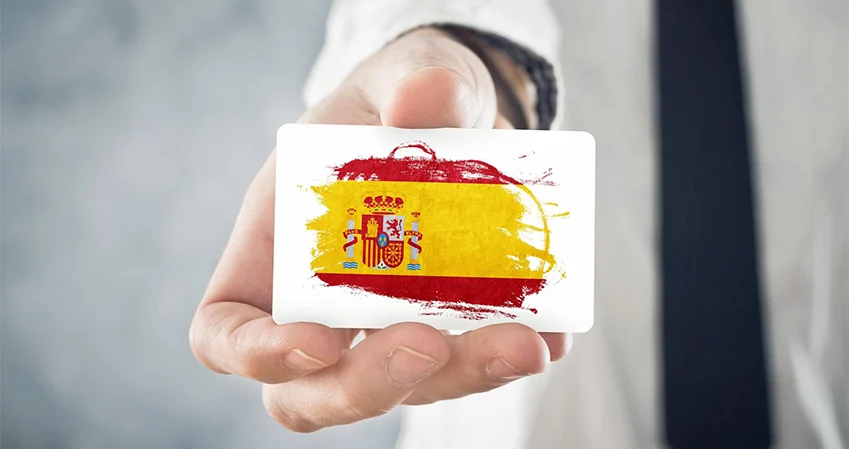Turnkey relocation to Spain from 6 weeks
We will help you to obtain a Spanish residence permit for the whole family with a minimum tax burden!
Read more
Get a free consultation
From 0 €
Tax burden per month
From 6 weeks
Term for obtaining a residence permit
5 years
Until permanent residence permit


#Residence permit for Individual Entrepreneurs
#Startup residence permit
 12/05/2025
12/05/2025
 Reading time: 6 min
Reading time: 6 min
 12/05/2025
12/05/2025
 Reading time: 6 min
Reading time: 6 min
How the Entrepreneur Residence Permit Differs from the Startup Residence Permit

Entrepreneurship and innovation play a key role in the economic development of countries. As a result, some nations, such as Spain, offer residence permits to attract talented businesspeople. Popular options include the entrepreneur residence permit and the startup residence permit, both of which allow individuals to run a business in another country. However, despite having similar goals, these visa types differ in several important ways that should be considered when choosing the most suitable option. Let’s compare the entrepreneur and startup residence permits, examine the requirements for each, and evaluate the opportunities they offer.
 Spain’s business residence permit is intended for those looking to expand their operations internationally. Entrepreneurs are given the opportunity to open or acquire a business in the new country and manage it going forward. The primary candidates for this permit include business owners (including small and medium enterprises), self-employed professionals, top-level managers, and investors willing to inject capital into the host country’s economy. These applicants may already have a successful business in their home country and seek to expand its reach. However, this type of residence permit is also suitable for small businesses and sole proprietors.
The startup residence permit, on the other hand, is aimed at entrepreneurs with innovative ideas who want to launch a new project. Spain supports the development of new ideas and technologies by offering startup founders the opportunity to bring their projects to life. Typical applicants include young entrepreneurs, innovators, and developers who may not yet have extensive business experience but can present a promising business plan that demonstrates a positive economic impact on the country.
Spain’s business residence permit is intended for those looking to expand their operations internationally. Entrepreneurs are given the opportunity to open or acquire a business in the new country and manage it going forward. The primary candidates for this permit include business owners (including small and medium enterprises), self-employed professionals, top-level managers, and investors willing to inject capital into the host country’s economy. These applicants may already have a successful business in their home country and seek to expand its reach. However, this type of residence permit is also suitable for small businesses and sole proprietors.
The startup residence permit, on the other hand, is aimed at entrepreneurs with innovative ideas who want to launch a new project. Spain supports the development of new ideas and technologies by offering startup founders the opportunity to bring their projects to life. Typical applicants include young entrepreneurs, innovators, and developers who may not yet have extensive business experience but can present a promising business plan that demonstrates a positive economic impact on the country.

 Both the entrepreneur and startup residence permits offer the opportunity to start a business in another country. The main difference lies in the profile of the applicant and the focus of their business plan. The startup permit is better suited to launching an innovative idea, especially for individuals without prior business experience. In contrast, the entrepreneur permit is a logical step for experienced businesspeople ready to invest significant capital in the local economy.
To increase your chances of approval, it’s essential to prepare all documents in advance, draft a detailed and viable business plan, and comply with official requirements. Working with a visa expert can greatly simplify the process and improve your odds of success. The team at El Relocador is ready to handle the application process for a Spanish residence permit, whether for a startup or an established business. They can help you develop a strong business plan, gather the necessary paperwork, and correctly file your application. Thanks to their experience and numerous successful cases, they know all the nuances and can maximize your chances of approval.
Both the entrepreneur and startup residence permits offer the opportunity to start a business in another country. The main difference lies in the profile of the applicant and the focus of their business plan. The startup permit is better suited to launching an innovative idea, especially for individuals without prior business experience. In contrast, the entrepreneur permit is a logical step for experienced businesspeople ready to invest significant capital in the local economy.
To increase your chances of approval, it’s essential to prepare all documents in advance, draft a detailed and viable business plan, and comply with official requirements. Working with a visa expert can greatly simplify the process and improve your odds of success. The team at El Relocador is ready to handle the application process for a Spanish residence permit, whether for a startup or an established business. They can help you develop a strong business plan, gather the necessary paperwork, and correctly file your application. Thanks to their experience and numerous successful cases, they know all the nuances and can maximize your chances of approval.
Go back to the blog
Definition and Goals of Each Residence Permit Type
 Spain’s business residence permit is intended for those looking to expand their operations internationally. Entrepreneurs are given the opportunity to open or acquire a business in the new country and manage it going forward. The primary candidates for this permit include business owners (including small and medium enterprises), self-employed professionals, top-level managers, and investors willing to inject capital into the host country’s economy. These applicants may already have a successful business in their home country and seek to expand its reach. However, this type of residence permit is also suitable for small businesses and sole proprietors.
The startup residence permit, on the other hand, is aimed at entrepreneurs with innovative ideas who want to launch a new project. Spain supports the development of new ideas and technologies by offering startup founders the opportunity to bring their projects to life. Typical applicants include young entrepreneurs, innovators, and developers who may not yet have extensive business experience but can present a promising business plan that demonstrates a positive economic impact on the country.
Spain’s business residence permit is intended for those looking to expand their operations internationally. Entrepreneurs are given the opportunity to open or acquire a business in the new country and manage it going forward. The primary candidates for this permit include business owners (including small and medium enterprises), self-employed professionals, top-level managers, and investors willing to inject capital into the host country’s economy. These applicants may already have a successful business in their home country and seek to expand its reach. However, this type of residence permit is also suitable for small businesses and sole proprietors.
The startup residence permit, on the other hand, is aimed at entrepreneurs with innovative ideas who want to launch a new project. Spain supports the development of new ideas and technologies by offering startup founders the opportunity to bring their projects to life. Typical applicants include young entrepreneurs, innovators, and developers who may not yet have extensive business experience but can present a promising business plan that demonstrates a positive economic impact on the country.
Main Requirements and Conditions
Differences Between the Entrepreneur and Startup Residence Permits
To obtain Spain’s entrepreneur residence permit, applicants must meet a number of requirements. First and foremost, the applicant must be of legal age and have no criminal record. They must also obtain comprehensive health insurance, purchase or rent housing in Spain, prove they have sufficient financial means, have business experience, and hold a relevant academic qualification. The requirements for the startup residence permit are slightly different. In this case, the key factor is not business experience but the innovative nature of the business plan. The applicant must demonstrate the viability and growth potential of the project. Having accommodation in Spain is not a mandatory requirement for this permit. To apply for a residence permit, applicants must provide the following documents:- A valid passport;
- A recent color photo;
- A business plan;
- A criminal background check certificate;
- A bank statement showing sufficient funds;
- Comprehensive health insurance;
- Documents for family members, if applicable;
- Payment receipts for government fees.
Financial Aspects
One of the key requirements for both types of residence permits is having sufficient funds in a bank account. These funds will later be invested in the business and contribute to the country’s economic growth. There is no fixed minimum, but typically the required amount is several tens of thousands of euros, depending on the business plan. Spanish authorities also check whether the applicant has enough resources to cover living expenses. By law, applicants must show at least 400% of the IPREM (similar to minimum wage)—about €2,500 per month. For family members, an additional 100% IPREM is required per person. Since this amount is adjusted yearly, it’s essential to confirm the exact requirements shortly before applying.The Role of the Business Plan

Entrepreneur Residence Permit
The business plan is a key document when applying for either type of residence permit. It shows the potential economic benefits for the host country, as well as the viability and scalability of the project. A thorough business plan should cover all aspects of the company’s operations, including:- Project Overview – Company background, goals, and sector;
- Market Analysis – Research on competitors and target audience;
- Marketing Strategy – Promotion of products or services;
- Organizational Structure – Team composition and management processes;
- Financial Forecasts – Initial budget, projected income, and expenses;
- Risk Management – Identification of risks and contingency plans;
- Economic Impact – Evaluation of the project's effect on the economy and labor market.
Duration and Conditions of Stay
Both entrepreneur and startup residence permits are issued for three years. This period is usually sufficient to fully launch a business and begin generating stable revenue. In general, the authorities do not closely monitor whether the permit holder strictly follows the initial purpose of their stay, so if plans change, it’s still possible to legally remain in Spain for the duration of the permit. After the initial three years, the residence permit can be extended for another two years, provided the applicant presents proof of business results and a new development plan. Additionally, applicants may be required to submit certificates confirming they have no tax or social security debts. If all conditions are met, applicants may become eligible for permanent residence after five years, and potentially for citizenship after ten years.Pros and Cons
The entrepreneur residence permit offers favorable conditions for entering a new market and attracting partners and clients. However, authorities will thoroughly assess the business plan to ensure it meets the requirements. The startup residence permit allows applicants to launch a new project without the need to demonstrate previous experience or an MVP (minimum viable product). The main challenge lies in convincingly demonstrating the uniqueness of the idea and its potential contribution to the country’s innovation landscape. Additionally, holders of a startup residence permit can apply for the Beckham Law, which offers reduced tax rates for foreign professionals for a limited time. Both residence permits offer significant advantages for entrepreneurs:- Living Abroad – The permit allows you to live in a European country, travel freely, and experience new cultures;
- Tax Incentives – Spain offers tax breaks during the early years of business development;
- Family Relocation – Applicants can include family members in the application, allowing them to move together.
- Document Preparation – Applicants must gather a large set of documents and may need to revise them due to bureaucratic nuances;
- Financial Requirements – Applicants must prove they have a substantial sum (around €30,000 per year for the main applicant), additional funds for family members, and investment capital according to the business plan.
Conclusion
 Both the entrepreneur and startup residence permits offer the opportunity to start a business in another country. The main difference lies in the profile of the applicant and the focus of their business plan. The startup permit is better suited to launching an innovative idea, especially for individuals without prior business experience. In contrast, the entrepreneur permit is a logical step for experienced businesspeople ready to invest significant capital in the local economy.
To increase your chances of approval, it’s essential to prepare all documents in advance, draft a detailed and viable business plan, and comply with official requirements. Working with a visa expert can greatly simplify the process and improve your odds of success. The team at El Relocador is ready to handle the application process for a Spanish residence permit, whether for a startup or an established business. They can help you develop a strong business plan, gather the necessary paperwork, and correctly file your application. Thanks to their experience and numerous successful cases, they know all the nuances and can maximize your chances of approval.
Both the entrepreneur and startup residence permits offer the opportunity to start a business in another country. The main difference lies in the profile of the applicant and the focus of their business plan. The startup permit is better suited to launching an innovative idea, especially for individuals without prior business experience. In contrast, the entrepreneur permit is a logical step for experienced businesspeople ready to invest significant capital in the local economy.
To increase your chances of approval, it’s essential to prepare all documents in advance, draft a detailed and viable business plan, and comply with official requirements. Working with a visa expert can greatly simplify the process and improve your odds of success. The team at El Relocador is ready to handle the application process for a Spanish residence permit, whether for a startup or an established business. They can help you develop a strong business plan, gather the necessary paperwork, and correctly file your application. Thanks to their experience and numerous successful cases, they know all the nuances and can maximize your chances of approval.








